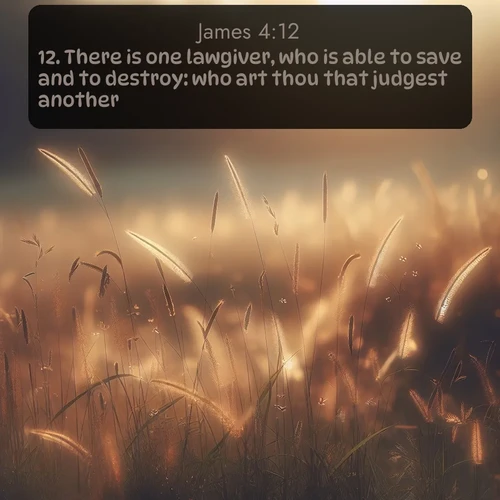James 4:12 plusieurs versions / traductions
English Bible Translations
12. There is one lawgiver, who is able to save and to destroy: who art thou that judgest another?
12. One [only] is the lawgiver and judge, [even] he who is able to save and to destroy: but who art thou that judgest thy neighbor?
12. There is only one judge and law-giver, even he who has the power of salvation and of destruction; but who are you to be your neighbour's judge?
12. One is the lawgiver and judge, who is able to save and to destroy: but who art *thou* who judgest thy neighbour?
12. There is one lawgiver, who is able to save, and to destroy: who art thou that judgest another?
12. one is the lawgiver, who is able to save and to destroy; thou -- who art thou that dost judge the other?
German Bible Translations
12. Es ist ein einiger Gesetzgeber, der kann selig machen und verdammen. Wer bist du, der du einen andern richtest?
12. Einer nur ist Gesetzgeber und Richter, er, der retten und verderben kann; wer aber bist du, daß du deinen Nächsten richtest?
French Bible Translations
12. Un seul est législateur [et juge]: c'est celui qui peut sauver et perdre. Mais toi, qui es-tu pour juger ton prochain?
12. Un seul est législateur et juge, c’est celui qui peut sauver et perdre; mais toi, qui es-tu, qui juges le prochain?
12. Un seul est législateur et juge, c'est celui qui peut sauver et perdre; mais toi, qui es-tu, qui juges le prochain?
12. Un seul est législateur et juge, celui qui peut sauver et détruire; mais toi, qui es-tu qui juges ton prochain?
12. Il n'y a qu'un seul Législateur, qui peut sauver et qui peut perdre; [mais] toi qui es-tu, qui condamnes les autres?
12. Il y a un seul Législateur, qui peut sauver et perdre. Toi, qui es-tu, qui juges les autres?
Versions with Strong Codes
James 4 / KJV_Strong12. There is[G2076] one[G1520] lawgiver,[G3550] who is able[G1410] to save[G4982] and[G2532] to destroy:[G622] who[G5101] art[G1488] thou[G4771] that[G3739] judgest[G2919] another?[G2087]
Strong Code definitions
G2076 esti/es-tee' third person singular present indicative of G1510; he (she or it) is; also (with neuter plural) they are:--are, be(-long), call, X can(not), come, consisteth, X dure for a while, + follow, X have, (that) is (to say), make, meaneth, X must needs, + profit, + remaineth, + wrestle. see G1510
G1520 heis/hice (including the neuter (etc.) hen); a primary numeral; one:--a(-n, -ny, certain), + abundantly, man, one (another), only, other, some. See also 1527, 3367, 3391, 3762. see G1527 see G3367 see G3391 see G3762
G3550 nomothetes/nom-oth-et'-ace from G3551 and a derivative of G5087; a legislator:-lawgiver. see G3551 see G5087
G1410 dunamai/doo'-nam-ahee of uncertain affinity; to be able or possible:--be able, can (do, + not), could, may, might, be possible, be of power.
G4982 sozo/sode'-zo from a primary sos (contraction for obsolete saos, "safe"); to save, i.e. deliver or protect (literally or figuratively):--heal, preserve, save (self), do well, be (make) whole.
G2532 kai/kahee apparently, a primary particle, having a copulative and sometimes also a cumulative force; and, also, even, so then, too, etc.; often used in connection (or composition) with other particles or small words:--and, also, both, but, even, for, if, or, so, that, then, therefore, when, yet.
G622 apollumi/ap-ol'-loo-mee from G575 and the base of G3639; to destroy fully (reflexively, to perish, or lose), literally or figuratively:--destroy, die, lose, mar, perish. see G575 see G3639
G5101 tis/tis probably emphatic of G5100; an interrogative pronoun, who, which or what (in direct or indirect questions):--every man, how (much), + no(-ne, thing), what (manner, thing), where (-by, -fore, -of, -unto, - with, -withal), whether, which, who(-m, -se), why. see G5100
G1488 ei/i second person singular present of G1510; thou art:--art, be. see G1510
G4771 su/soo the person pronoun of the second person singular; thou:-- thou. See also 4571, 4671, 4675; and for the plural 5209, 5210, 5213, 5216. see G4675 see G4571 see G4671 see G5209 see G5210 see G5213 see G5216
G3739 hos/hos, including feminine ho ho probably a primary word (or perhaps a form of the article 3588); the relatively (sometimes demonstrative) pronoun, who, which, what, that:-one, (an-, the) other, some, that, what, which, who(m, -se), etc. See also 3757. see G3588 see G3757
G2919 krino/kree'-no properly, to distinguish, i.e. decide (mentally or judicially); by implication, to try, condemn, punish:--avenge, conclude, condemn, damn, decree, determine, esteem, judge, go to (sue at the) law, ordain, call in question, sentence to, think.
G2087 heteros/het'-er-os of uncertain affinity; (an-, the) other or different:--altered, else, next (day), one, (an-)other, some, strange.
Prédications qui analysent les thèmes Jacques 4
Thèmes : Plantes et animaux; Écosystèmes terrestres; Conservation de la biodiversitéRelated Sermons discussing James 4
Themes : Plantes et animaux; Écosystèmes terrestres; Conservation de la biodiversitésee also: Bible Key Verses ; KJV Bible Images, BBE Bible images

